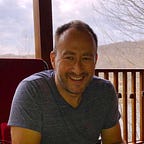It’s hard to know where to begin when describing Pandemonio speaker Jon Gosier. He’s a developer; an investor; and busy changing the world. A TED fellow and Knight News Challenge award winner, he’s built tech to make communications possible in disasters, and he’s the founder of Audigent, a music analytics company.
It’s also hard to know where to start when interviewing him, so we asked him a wide-ranging set of questions when learning more about what he’s been up to, and what kinds of insights he’ll be sharing with attendees in February.
Pandemonio: Can you tell everything from someone based on their listening habits?
Jon: At Audigent, we are collecting data on behalf of the world’s biggest recording artists and influencers. We collect data from all the audio and video streaming platforms, radio stations, retail stores and social media. We then help them understand who’s listening to their stuff, what they are listening to, when, where those individuals are based, and across which channels and devices they’re listening.
While we don’t think its possible to tell everything about these audiences, we do learn powerful things. These insights are critical in helping the artist or influencer understand their own world, so he or she can know how to improve—or act on—the relationship with their fans.
It used to be that the public had to be individually surveyed in segments in order to get this data. That was expensive, slow, and not always the most accurate. Companies like Audigent are giving real-time feedback to artists and record labels. From that perspective, it’s a game-changer. Artists win because they know more sooner; and fans benefit win the they get more of what they want from the influencers they cherish.
P How can technology help the “middle billions” in far-off regions?
J Well, with Audigent, music listeners are everywhere. Our platform is global, so artists, influencers and fans everywhere benefit. We do directly serve a global populace.
However, over my career I’ve worked in many parts of the world on some very diverse and sometimes difficult projects, including disaster response software, pirate mobile networks, and a number of humanitarian projects. In these cases, my colleagues and I were more directly using data to help people.
Data in particular is very powerful when applied to solve humanitarian concerns. Some examples include crisis-mapping that helps people in disasters get the urgent support they need; block chain technologies that offer transparency and a bread-crumb trail that can reduce corruption; and even simple messaging solutions can keep families connected who are displaced due to conflict or climate change.
P What do you look for in an organization to tell it’s innovative?
J As an investor, I really only have two signals that let me know if something is really cutting edge: Do I believe in the people behind the innovation—and do I believe in in the innovation behind the people.
Both are bets on the people. The former is about whether or not people have the experience, intellect, or creativity to build great things. The latter is about whether or not the founders are humble and self-aware enough to surround themselves with the right people and not get in the way of something that can be massive.
In business innovation, it’s not just the initial spark of a great idea. Execution is a part of innovating.
P Is there a risk to creativity or serendipity when we become too data-driven?
J There can be, but serendipity can also be greatly improved through data. People often make the argument that focusing too intently on metrics and analytics can lead to ‘navel-gazing’, blinding people to intuition.
I’ve always been fascinated by serendipity as it relates to technology and data science. What unexpected insights are buried within troves of big data? What can an automated system alert you to that otherwise would have gone unnoticed?
P With sensors everywhere, how will we change our perception of the world? Can we handle all the information?
J We’re quickly discovering how much the world slips out of our control the more technology becomes pervasive. Look at governments around the world that have been targeted by hackers. It’s only because of their use of modern technology that such wide-scale leaks are even possible.
Although technology makes things faster and far more efficient, the trade-off is often privacy or security—or both. It’s a double-edged sword. If everything is being measured and tracked, the proposition is a vastly different one depending on who exactly is doing the measuring and tracking.
It’s a slippery slope—but one on which the world will continue to be precariously perched.
